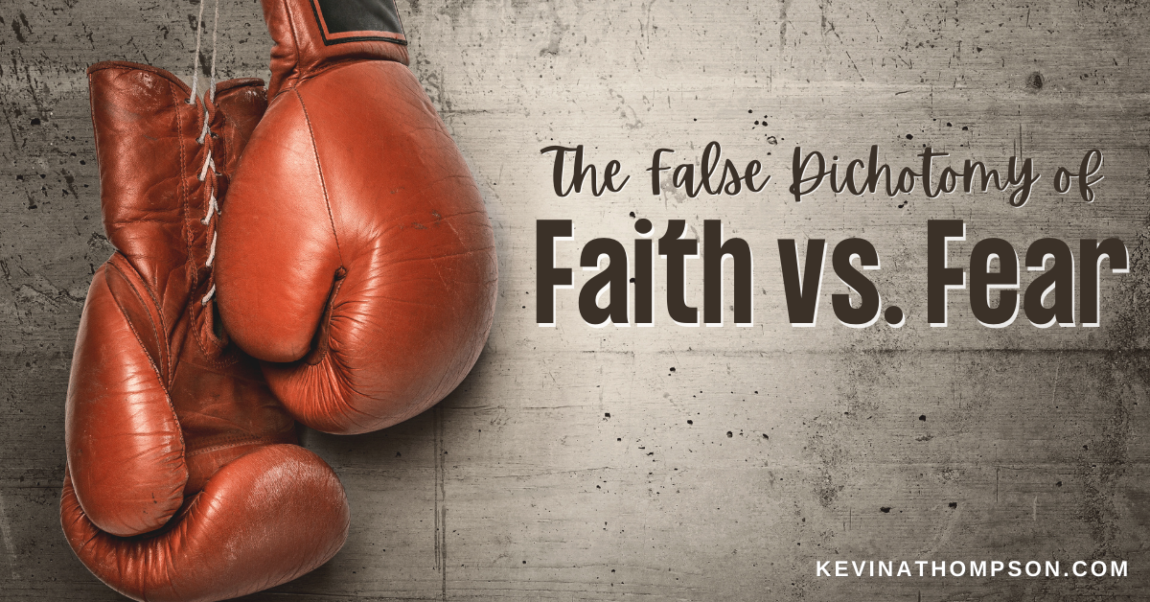“Faith over fear,” they say. I get it. It’s a much-needed encouragement not to allow fear to wreck our lives. And that is what fear is doing. It has a corrosive impact on our lives leaving collateral damage all around us. Many, if not most, of the problems we face, are a byproduct of fear. What’s troublesome is we often don’t realize it. We do not believe fear impacts us much when in reality it is destroying our lives.
So people encourage us to have faith.
And who doesn’t need to have more faith?
I get it.
But I also don’t like it.
I especially haven’t liked it this year. In a variety of conversations during COVID, I have continually been told to have faith over fear. The implication is that taking meaningful precautions regarding the virus is a sign that someone is acting out of fear instead of faith. This discussion reveals a major flaw in the faith versus fear dichotomy.
When Faith Over Fear Is Right
There is a time in which pitting faith against fear may be the right dichotomy. When Jesus invites Peter to walk on water, he quickly does the miraculous. Yet as Peter took his eyes off of Jesus and began to consider what he was doing, the miracle-walking became a near-drowning. For decades, pastors and Sunday School teaches have used this passage to point out our need to experience faith over fear.
In that vein, it’s a proper discussion.
Yet there is something very unique about that situation–it involves no one else. Whether Peter walks or drowns is an issue solely between Peter and Jesus. It matters not to anyone else.
So when it comes to an issue that has absolutely no impact on anyone other than you, thinking in terms of faith over fear can be a useful thought.
However, how much of life does that cover? Not much. A vast majority of issues in life have a tremendous influence not just on us, but also on others. What we do impacts them as well. In those situations, thinking in terms of faith over fear can be greatly misleading.
The Danger of Faith Over Fear
The problem with faith over fear is that this dichotomy puts all consideration on us and no consideration on others. What’s best for me? What should I do? What am I feeling? These are the questions that faith versus fear brings to mind.
All of these questions are focused on me. (See: Never Give Fear the Driver’s Seat)
When we think in terms of faith versus fear we are tempted to just consider ourselves. But rarely do we make good choices when fixated on ourselves. We were never created to be the center of the universe–even our own universe. When we center on ourselves, we create a scenario in which we will not make wise choices.
So even as we encourage others to have faith over fear, we run the risk of enabling selfish thinking which can lead to bad outcomes.
A Better Contrast
Rather than thinking of faith versus fear, it is more productive to think in different terms. First, we all have faith. Everyone is putting trust into something in hopes that the object of their faith is going to help them. Some actually have faith in fear. They hope by making choices based on fear, their fears will not come true.
So what is the opposite choice? It’s love.
Fear versus love: in which will you have faith?
We can either trust that making choices based on fear will lead to better outcomes or we can have faith in the way of love. Those are our choices. Whatever drives our choices will reveal our faith.
The gift of this contrast is two-fold:
First, it focuses on actions rather than feelings. While feelings are important, our actions reveal our hearts. When we contrast to fear and love, we focus more on what we do rather than just what we feel.
Second, it empowers us to think beyond ourselves and to look toward others. When we see ourselves but don’t center ourselves and instead focus on others, we make better choices.
Contrasting fear with love is more productive than considering it in comparison to faith.
Love Versus Fear
At nearly a moment-by-moment basis we are faced with the decision of love versus fear. While it is okay to feel fear, we cannot be driven by it. Instead, we must choose the way of love.
Love says forgive; fear says forgiveness is risky. Which do you believe?
Love says to speak the truth; fear says you better keep your mouth shut. Which do you do?
Love focuses on others; fear fixates on self. Which is your default?
This is the lens through which we should view life. By seeing things as an opportunity to choose the way of love, it empowers us not to be overwhelmed by life’s circumstances but to navigate them with confidence that we are choosing the right way.




2 Responses to The False Dichotomy of Faith Versus Fear